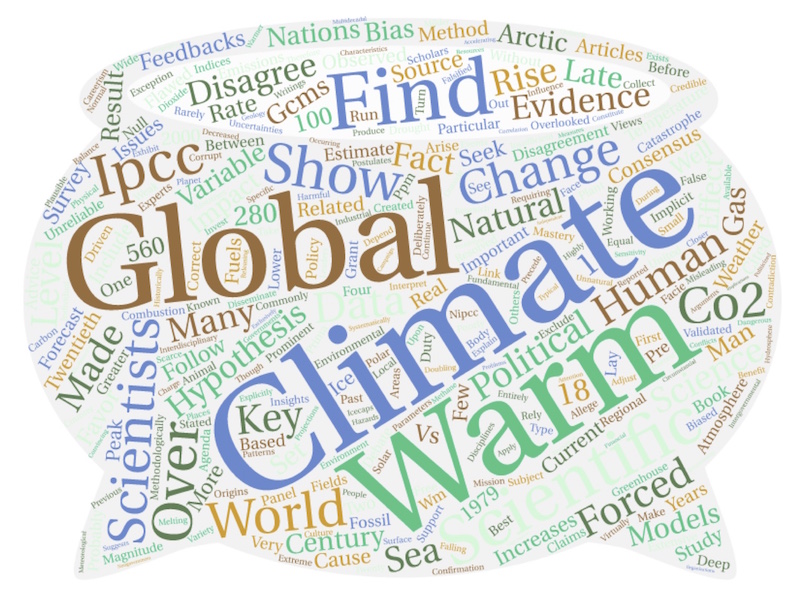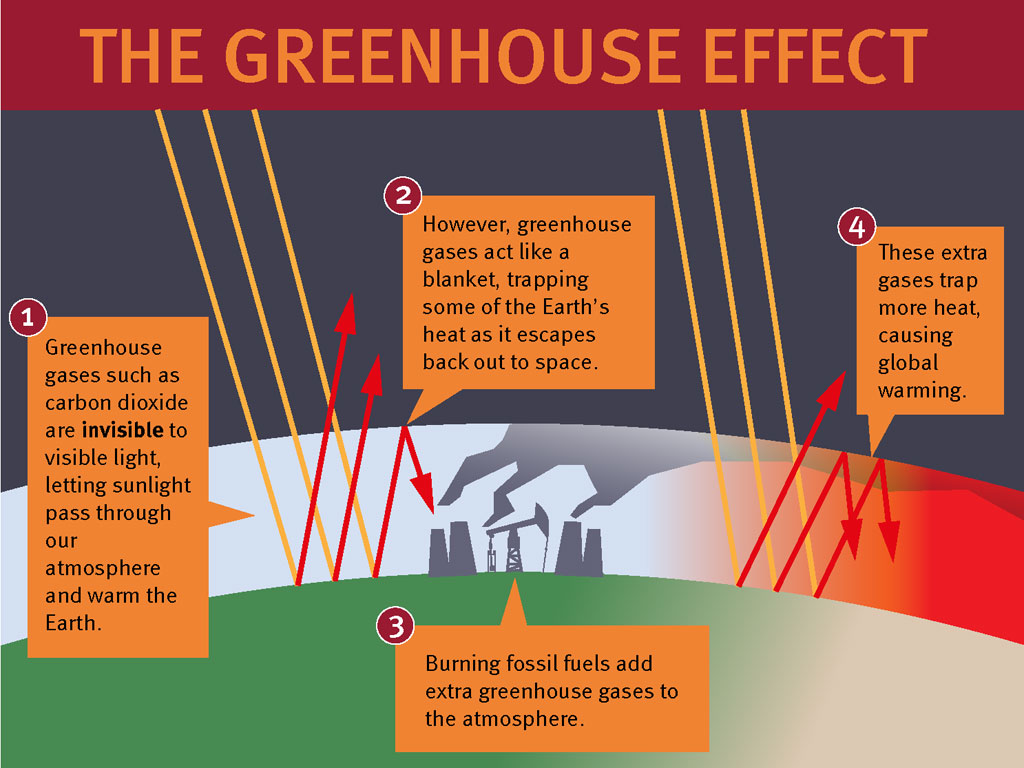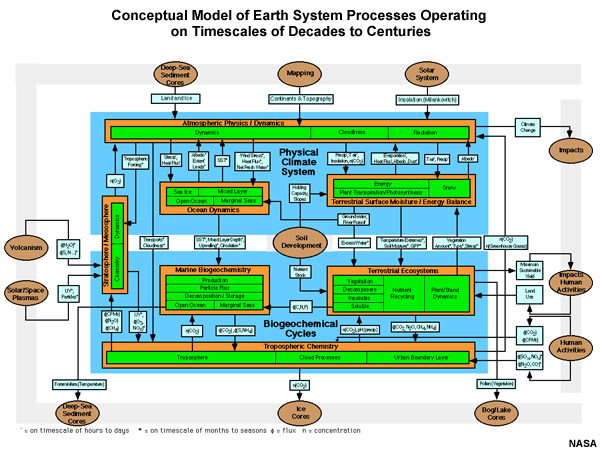Heartland: What's your story?
Posted on 10 April 2017 by Sarah
If you teach physical science your mailbox may have recently been assaulted by a tract from the Heartland Institute titled "Why scientists disagree about global warming." The lie in the title is an excellent preview of the book's contents. Its numerous specific errors mask the fundamental mistake of all these piecemeal attacks on the scientific consensus: lack of a coherent narrative to describe the data.
The two essential ingredients of science are data collection and a coherent narrative about what the data tells us. Heartland's repeated attacks on climate science utterly fail on the second point. In decades of promoting their pro-fossil fuel agenda Heartland has never presented a single coherent story to explain recent or past climate changes, and none of their accomplices have either (Benestad et al. 2015). Like many science deniers, they confuse science with data collection. They imagine that a story can be discredited by discovery of a misplaced comma.

A kettle of words is not a story.
(These words are from the Heartland tract.)
Scientists from many fields have collected mountains of data about changes to the global climate. They have systematically refined the century-old hypothesis that greenhouse gases maintain our global temperature (Arrhenius 1896). That hypothesis has now consolidated into the well-established consensus that the recent massive addition of extra carbon dioxide to our atmosphere is changing the climate.
Key aspects of an accepted scientific explanation are (i) it fits all existing relevant data; (ii) it obeys the known physical laws; (iii) it continues to work as measurements get better and new data is collected; (iv) it makes predictions that can be tested. The narrative of anthropogenic climate change magnificently satisfies all those requirements.
World wide observations and measurements of temperatures, atmospheric composition, Arctic thawing, ecological shifts, sea level rise, increased rain intensity, and glacial melting are all explained by the fact that the Earth is warming. Furthermore, millennia of past variations in the climate, which are revealed in ancient geological and ice records, are also well explained by our ever-improving understanding of the Earth's climate system.
The consensus understanding of climate change follows the established laws of astronomy, physics, chemistry, biology, geology, oceanography and other disciplines. It has advanced with intense discussions among experts from different fields who work to understand how different parts of the Earth interact. Unlike the Heartland approach, real climate science does not rely on imaginative "cycles" or inventive notions about the behavior of greenhouse gases.
New observations continue to strengthen and solidify the science of climate. For example, a recent study of 37 glaciers around the world over the last century found the retreat of all but one could only be explained by the changing climate (Roe et al. 2016).
A good story about how things work also anticipates how the world will unfold in the future. Again, climate science has been making remarkably good predictions since the 1970s (Nuccitelli 2015) and IPCC projections are on track. Meanwhile even recent "predictions" by Heartland's denialist friends have failed miserably.
A robust scientific explanation seeks to incorporate new information to update and refine a coherent story. It doesn't view each piece of data as an isolated event, divorced from the rest of the world. At a bare minimum, explanations of different parts of the story must not contradict one another. Furthermore, a really great science story can be explained to everyone from a child to a scientifically educated adult. It holds together at a basic level and becomes stronger with each layer of detail described.
|
Explaining climate change – kids' version. |
|
A cardinal rule of science is that anyone who attacks a story that explains the data must provide a more convincing story to replace it. Because Heartland has utterly failed to form a coherent theory of any kind, they persist in making unfounded attacks on the evidence and on the scientists who have assembled it into a truly remarkable history of the Earth and projections for its future.
Heartland resembles the pathetic relative of a convicted con-artist who stands outside the courthouse whining that the fingerprints on the fifth incriminating bag of cash were smudged, the judge's second cousin hates gambling, and all the convict's business partners swear he didn't do it.
Heartland: What's your story?































 Arguments
Arguments























 Explaining climate change – advanced model. Source:
Explaining climate change – advanced model. Source: 








Suggested supplemental reading:
Climate Change Skeptic Group Seeks to Influence 200,000 Teachers by Katie Worth, Frontline, Mar 28, 2017
Climate Change-Deniers ‘Spam’ Thousands Of Teachers With Anti-Global Warming Packages by Nick Visser, Huffington Post US, Mar 30, 2017
How climate skeptics are trying to influence 200,000 science teachers by Charlie Wood, Christian Science Monitor, Mar 30, 2017
Déjà vu all over again: Heartland Institute Peddling Misinformation to Teachers about Climate Change by Brenda Ekwurzel, Union of Concerned Scientists, Apr 7, 2017
Educators Decry Conservative Group's Climate 'Propaganda' Sent to Schoolteachers by Phil McKenna, InsideClimate News, Apr 10, 2017
The word that nobody seems to know is
"consilience"
...and it is what makes the climate change theory an established theory, much like evolution, not a hypothesis.
https://www.scientificamerican.com/article/why-climate-skeptics-are-wrong/
[JH] Rest assurred that the SkS author team and most of our regular readers know the meaning of the word consilience.
To get a basic understanding of what climate models are, check out this recently posted article...
Yes, we can do ‘sound’ climate science even though it’s projecting the future by Kevin Trenberth & Reto Knutti, Conversation US, Apr 5, 2017
Note: Trenberth & Knutti recommend using the word projection (rather than predicition) to describe the output of climate models.
Consilience is indeed an excellent term for the agreement among multiple streams of evidence for climate change.
We should use that word more often; it's a feature notably lacking in alt-theories of climate.
Thanks Sarah and I am pretty sure most people here know it. The mainstream media needs to hear it. I expect that more than half the talking heads will be forced to look it up.
:-(
A forceful placement of climate chance as a "Theory" well substantiated and co-equal to other established and accepted theories (eg. Evolution) can cancel much of the noise being injected by the denialsphere.
Oy! A forceful placement of climate change - Interesting form that slip takes though, taking a chance.
Consilience is a good word. Everything points at fossil fuels causing a greenhouse effect, from many lines of evidence and different fields of enquiry. If it walks like a duck, and quacks like a duck, it probably is a duck.
Natural causes for the recent warming period have been exhaustively investigated, and ruled out. Every possible idea has been suggested, and evaluated (and this is a good thing). It seems very improbable that we have missed some natural cause.
We are 95% sure we are causing climate change, yet many don't take the problem seriously. This doesn't make sense, because with anything else 95% proof would be sufficient. If some local government authority said they are 95% sure the local river is polluted by bacteria from cows, I think most people would accept this as compelling enough, especially when the evidence is explained.
Of course theres a particularly ruthless campaign to spread doubt about the climate science.
Our other main problem is politicians captive to fossil fuel, business, and ideologically motivated lobby groups. You have to get this out of politics somehow, and tax payer funded election campaigns is one option. At the very least, make activities of lobby groups, funding sources, and donations to election campaigns very public and transparent, so the public can see what influence is operating.
@ bigchip
to reinforce JH's point i even know, without looking it is an article by Micheal Shermer
conversly i can guess with a high degree of acuracy a denier link to science, just from the URL
it is usually the Zwally antartic study, or the recent "greening" study
Consilience is a very good word. Unfortunately, it is also "science-speak" and therefore it isn't a particularly good word to use in communicating climate science to the average person.
For those who haven't read it or forgotten, it's worth to refresh one's mind by looking at CC Cluedo post to appreciate the extent of consilience in the science of climate change/AGW attribution. Especially the evidence matrix at the bottom.
Any comparison to the contrarian "arguments" by Heartland simply does not exist: any Heartland talk is just silly noise.
You make an important point: In a debate, we expect troll behavior, meme's waiting in ambush to trip up the conversation ("Earth is old and climate cycles naturally!"). But our schoolchildren deserve more than knowing what isn't driving their modern climate. As in all things, they deserve our best explanation. It's why we send them to school. Judge Heartland "Heartless" on this one.
Regarding Consilience. Use of a term that:
may not be as helpful as using more words to make a point.
The growing predilection with brevity and punchy unjustified, and even totally irrational, info-bites Winning popular support has developed many damaging consequences. An example is the popularity of America First, even though the majority of actions that have been taken and could be defended as being America First, such as the reversal of USA actions to reduce the production of additional CO2, are clearly contrary to improving the future for humanity.
12:@onePlanet - I don't think there is much chance of "consilience" being misunderstood. As words go it is pretty unambiguous and more to the point, for the talking heads the need to look it up (in secret) may well surprise them (how many of us are still learning new words?) and the point more clear as a result. I have never, ever, had any backscatter from it, not from denialists, not from anyone.
Denialists can only ignore it (so far that is all they do).
The point I am making however, is not for the denialists. It is for the news readers and news reporters (assuming that there are still some people paid to gather and verify news... somewhere). People who are attempting to achieve "balance" without real knowledge. People who shape the information flowing from the American media.
Convince them, and let them use words that ordinary folks understand. We use the word in interviews and media encounters. That forces the pace for the media. They are obligated by their profession to at least try to be competent in their native language. Not something they can ignore and not something they will misunderstand.
To use it with the masses? Maybe you'd be right about that "elitist" stuff but I would not expect even that. It is an ordinary word that is not commonly used, not a Scientific term. For people so far gone as that, there is no hope as they would rather die than change their minds. The objective is not to let them decide what the rest of us will do.
THAT takes a reduction of ignorance in the electorate in general. Which takes the media and the schools. Only an informed electorate is going to UN-elect Lamar Smith and the T-rump. I've seen this word work for me and I think that in the main, it will do a good job... on my intended targets :-)
As for the brevity and punch-drunk, that'd be facebook and the twits. A form of self-induced attention-deficit-disorder. Zuckerberg created a monster to eat the brains of a generation. Getting careful analysis into a Facebook post is torture. As a result there are children I know who cannot at 18 years, tell me what an analysis is or perform one. They can have opinions though... that's all facebook provides for.
I don't think this story ends well. I will keep trying until my last breath, but I don't expect to succeed.
I'm not intending to insult High School general science teachers as I've been one myself - although my prefered subjects are Maths and Physics - but perhaps consilience needs to be use more often in the science narrative in schools? Just a thought.....
One Planet has a point. If you were to just start using the word consilience, in a popular public forum, most people wouldn't know what it meant.You would have to define what it meant, especially in relation to climate.
That's ok though, because it applies to all sorts of other things and illustrates a more general point. It's a worthwhile word to learn.
Any chance of a larger copy of the COMET chart, it's not accessible to we lesser mortals?
Anyone who has watched a courtroom drama on TV is familiar with consilience even if not the word. "His fingerprints were on the murder weapon, me lud, plus the victim's blood on his jacket, he's clearly visible on the security camera and he will inherit $1,000,000 from the victim's will." Convergence of evidence from multiple sources.
I was going to list dozens of things that would indicate to a curious person that something isn't right but I'm sure my comment would be deleted so why bother.
I have a BS in Physical Science paid for by your tax dollars. I also have a MBA paid for my your tax dollars.
I'm a global warming agnostic... Meaning I agree with the data but not the cause and I choose to think the problem is far from being solved as it's much more complicated than we pretend it is.
So you feel the title of this book is a lie?
I propose that your website is also misleading. You are not skeptical as it's clear you and the folks here absolutely know the ocean level increase and temperature increase since 1900 is directly correlated to the increase in CO2 even though man's contribution didn't kick in until the 1950's.
I don't and thus I'm a denier.
I'm told I can't read data correctly.
I'm told by NASA their own chart that shows more ice growth over nearly all of Antarctica is actually showing melt.
When raw data and methods are not made public even when funded by the government I wonder.
Stay skeptical!
PS The 100 ppm increase in atmospheric CO2 is nothing. However that's a 33% increase for plants which is massive. NASA has been documenting the greening of the world from space. More plant growth, more water vapor, more heating?
[JH] Sloganeering deleted.
Please note that posting comments here at SkS is a privilege, not a right. This privilege can be rescinded if the posting individual treats adherence to the Comments Policy as optional, rather than the mandatory condition of participating in this online forum.
Please take the time to review the policy and ensure future comments are in full compliance with it. Thanks for your understanding and compliance in this matter.
fishfear@18 said "I have a BS in Physical Science...[and] a MBA..." The issue here, as the author relates, and as I picked up on earlier, is that our children have neither. They go to elementary school to learn what we, in general, accept (for example: we live in a 'Democracy'). The subtleties must come later, after the BS (well, more like a 'Dollarocracy', but close enough). With the vast expert consensus (and consilience) for anthropogenic global warming, do you really want us to teach our kids that your BS is relevant (I mean, to more than just yourself)? I think, at first blush, most people would think that profoundly egotistical of you. You're not the only person who has studied Science, after all. Go ahead and own your skepticism, just don't tell the rest of us (and especially don't preach to our children) that it 'trumps' the overwhelming scientific consensus on Climate Change by people who have actually competed to make the team of 'experts' on the subject. It's like saying if only you'd been made Quarterback of the Atlanta Falcons, they would have won the last Superbowl.
fishfear,
Whether you're a professional research scientist or an interested layperson, it's important to know what sources of scientific information are reliable. Texas State Climatologist John Nielsen-Gammon has spoken and blogged about Scientific Meta-Literacy:
Shortest version: if you get your climate science information from the peer-reviewed reports of working climate scientists, you'll get the closest picture of the truth. For a highly credible review of all the evidence for AGW, however, no source can be considered more trustworthy than the US National Academy of Sciences, founded by Congress in 1862 "to advise the nation on important scientific matters." Since then the NAS has scrupulously resisted all efforts to politicize its advice. New members are elected by the existing membership, and only the most widely- and well-respected candidates are so honored.
Two years ago the NAS and the Royal Society of the UK (chartered by Charles II in 1662) jointly published a 34-page booklet titled Climate Change: Evidence and Causes. It's written for educated non-scientists like yourself, and is free to download at the link. It offers a brief tutorial on climate basics, and addresses 20 questions laypeople often have about anthropogenic climate change. Links to primary sources are provided throughout.
In the Foreword to the booklet, signed by the then-presidents of both societies, the first two sentences are [all-caps in the original]:
I have not made an argument from authority, but from scientific meta-literacy. If you don't trust the NAS and the RS, why would you trust anyone else?